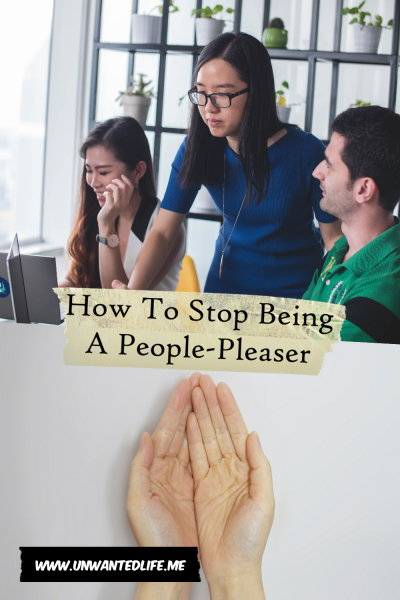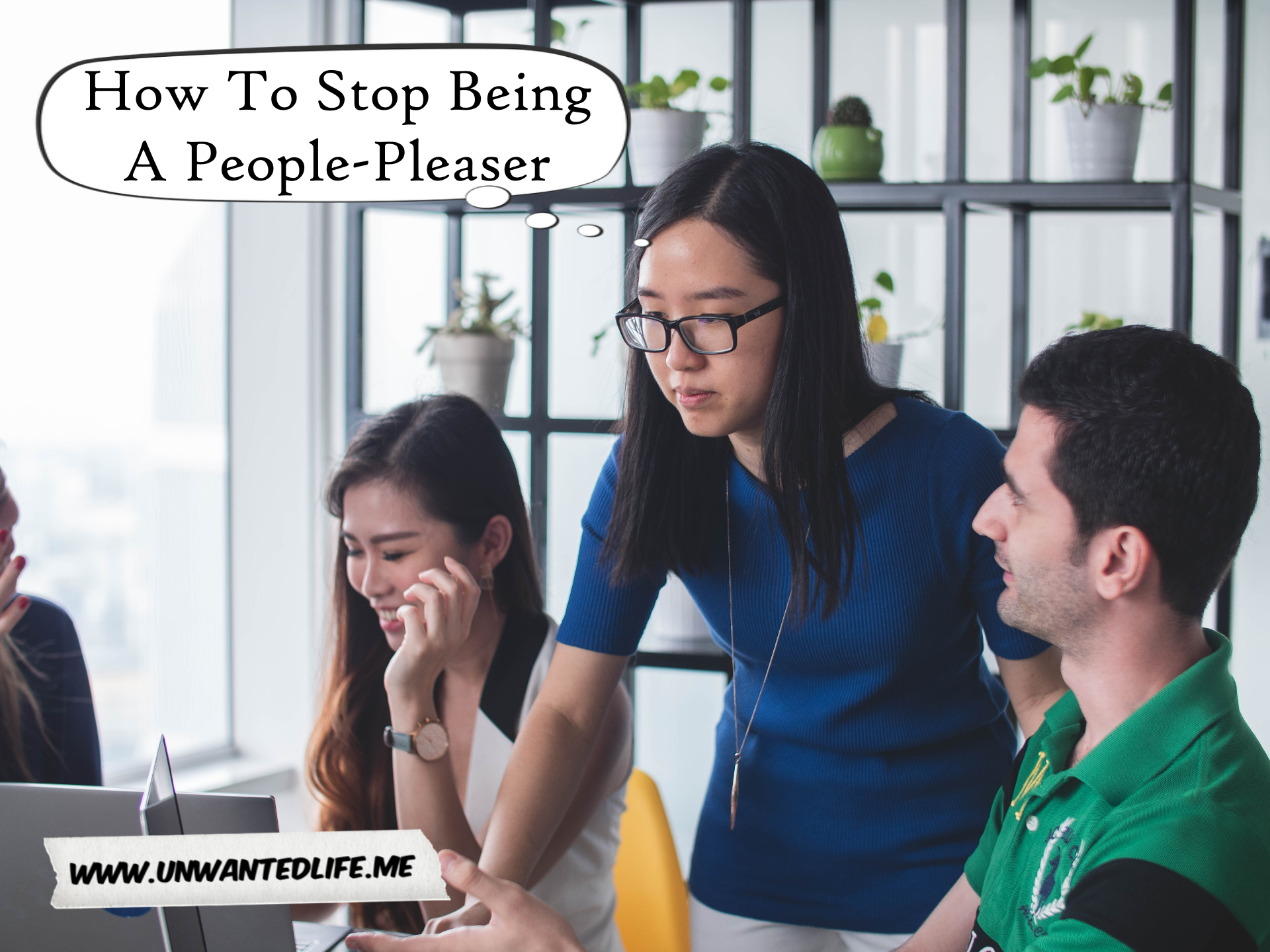As promised in ‘The Dangers Of People-Pleasing‘, I’ve created a list of helpful ways to help anyone overcome their issues with being a people-pleaser. I know some of these have helped me overcome my problem with people-pleasing, which was caused by the need to be accepted, due to the racist abuse I suffered growing up (Suicidal Child #ChildrensMentalHealthWeek).
Without further ado, here’s the list of ways to help you try stopping being a people-pleaser:
Internal validation
You won’t ever be truly happy until your validation comes from within you, rather than from the outside. You’ll need to flip this around if you’re going to stop being a people-pleaser.
Thus, work out ways to feel good on the inside, so that you no longer feel the need to get external validation in order to feel good. You could also try hanging out with good people who make you feel accepted without having to do anything for them.
Remember, you are good enough, and what you want does matter.
Making the choice
Making a choice may be hard, but it’s the only way to stop being a people-pleaser. Choose to say no when you don’t want to do something and choose to say yes if you want to or don’t mind doing something. It’s your choice to say yes or no to a request, so pick the one that is good for you. Being able and willing to make the choice, rather than always saying yes, will help you overcome being a people-pleaser.
Baby steps
To help make the choices you actually want, start small with your no’s so you can build up your confidence, your self-esteem, and your self-worth. “Go big or go home” attempts will most likely cause more harm to you than good.
Remember, saying no has its benefits. It’ll help you reduce your stress levels, avoid burnout, and give you more time to do the stuff you want.
Also, try using empathy when saying no to the requests people make of you. It’ll make saying no easier for you, whilst also showing the person that you acknowledge them and hear them.
Work out your priorities
If you want to stop being a people-pleaser, then it helps to know what your priorities are. Knowing this will also help you decide if you want to say yes or no when requests are made of you.
Also, in order to assist you with your choices, it can also help to know your goals in life. This can be best achieved by actually sitting down and working out your goals. To help with this, try reading ‘SMART Goals: An Amazing Way To Achieve Your Aims‘.
Playing for time
It’s ok to stall when someone asks a favour of you so that you have time to think about if you want to do it or not. This is a good step to take if saying no is still a problem for you because it removes the pressure of the moment.
Whilst you’re thinking about the favour that’s been asked of you, if it helps, you could look at it through a cost/benefit approach.
Create boundaries
Having healthy boundaries is good for everyone, but especially for you. They protect you from getting hurt and let others know your limits. For more information and advice on creating boundaries, visit my post ‘Boundaries: Protecting Your Personal Space‘.

Don’t rely on excuses
Try not to use excuses, which is easier said than done. I know I have that problem. However, if you give them excuses, then you give the person(s) making the request of you, room to convince you to say yes.
For example, if you say you’re busy doing such-and-such, then they may say, “Oh, that’s ok, you should have plenty of time afterwards to still do that”.
If it’s not your fault, don’t say sorry
Like I said before, people-pleasers can say sorry a lot. Thus, if you want to overcome your people-pleasing tendencies, then learn to say sorry only when it’s directly linked to something you’re responsible for. Break the apology habit. Which won’t be easy if you’re British. We’re constantly apologising.
Burn bridges
Don’t be afraid to cut the toxic people out of your life. They will take and take until you can’t give anymore, causing you to burn out. You can try talking to them first, to see if they’ll change the way they treat you and use you. But be prepared for if they aren’t willing to make the effort because your needs and wellbeing are equally important.
The fallout after the ‘No’
What helps keep some people people-pleasing is the fear of what’ll happen after they say ‘no’. The reality is that the person making the request is probably already thinking about who they can ask instead, even if they’re still trying to convince you to help them. This is especially true if you have a good relationship with the person making the request. The only time this will most likely be an issue is if you’re in an abusive relationship (What Is Domestic Abuse? Advice And Information).
Learn to stop worrying about the outcomes when you say no, by focusing on the fact that the person asking for your help will have other people they can ask.
Reinforce
Use positive self-talk when you say no when you’re asked to do something, or yes, if it’s something you don’t mind helping with. In short, whatever choice you make for yourself, reinforce that choice with positive self-talk.
For example, if you said ‘no’ to something you didn’t want to do, then you could say to yourself, “You were right to put your own needs first”.
You could also treat yourself with healthy rewards for saying no to things you really don’t want to do. This also helps reward the behaviour you wish to change to, supporting the change from being a people-pleaser.
Build confidence
There are a number of things you can do to help build confidence, which will help you overcome your people-pleasing problem.
- Create and maintain a positive support network. Even an online positive support network will do.
- Focus on the positive.
- If you do have negative thoughts, then turn them into a positive one.
- Learn to be proud of your skills and achievements.
You can’t be in two places at once
People-pleasers want to make everyone happy, which is an impossible task. So repeat to yourself whenever you need to that “you can’t make everyone happy”, and you can’t be everything to everyone. If you want to get past your people-pleasing problem, then you need to come to terms with the fact that everyone is in charge of their own happiness, and you’re not in charge of everyone else’s happiness.
People-pleasers believe pleasing others is the same as being kind. It’s not. It’s not selfish to turn down a request, and you’re still a good person if you say no. Your self-care is important. Don’t agree to do something unless you’re comfortable doing what’s requested.
Time
Lastly, when you’re trying to make the changes needed to overcome your people-pleasing, remember to give yourself time. You’re not going to change overnight, and that’s ok. Don’t get disheartened over the fact that it’ll take time before the changes happen, and become a permanent change in your behaviour.
As always, leave your feedback in the comments section below. Also, feel free to share your experiences of being or knowing a people-pleaser in the comments section below as well. If you want to stay up-to-date with my blog, then sign up for my newsletter below. Alternatively, get push notifications for new articles by clicking the red bell icon in the bottom right corner.
Lastly, if you’d like to support my blog, then you can make a donation of any size below as well. Until next time, Unwanted Life readers.


Working out my priorities is a big one for me -If I do this, I feel like it’s less of a no to someone and more of a intentional decision of choosing me (though easier said then done at times). Great article, as always!
Thanks. It really is easier said than done, but worth it
Good post! I agree with all these tips. It’s ok to say no sometimes, and yes……. surround yourself with good sincere people that you don’t need to impress. Life is way much happier this way. Thank you.
Indeed it is, although it can be hard to find the right people to surround yourself with sometimes
Great follow up. I reckon I’m about 50/50 with what I do and don’t do. The British problem of constantly saying sorry is a real thing. And my biggest issue.
My partner is forever saying sorry, it makes other British people seem normal
I will keep reading this and repeating it until i can finally put it into action without even thinking about it#
People pleasing puts me in some horrible situations sometimes
It did the same to me too
I’m trying to get better at so much of this. Thanks for the good ideas. It’s taken years of practice, but really finally improved at not apologizing unless it’s something I really need to apologize for.
I’m glad you’re now able to stop apologising all the time, I hope my partner will eventually be able to do the same
Great tips, I struggle with being a people pleaser quite a bit
I use to really badly, and I was still behaving like that even though I fully knew I was being used
It felt so good to finally say no and cut the bridges. It was very difficult but with time I’ve gained my confidence back and have never felt happier. Thank you for this post.
I’m glad you’re doing better now ??
Building confidence to say no to folks is key. Love this post. Thank you.
Campo Jac
Indeed it is